Good morning!
Greetings in the name of the father, the son, and the Holy Spirit.
Therefore as you have received Christ Jesus the Lord, so walk in Him, having been firmly rooted and now being built up in Him and established in your faith, just as you were instructed, and overflowing with gratitude. (Colossians 2:6-7)
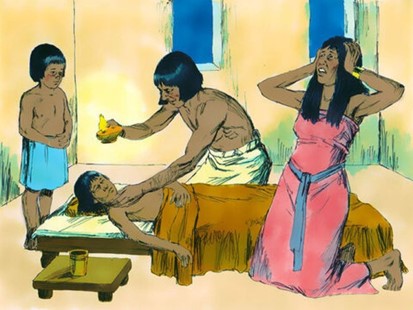
Pharaoh fought and fought against Moses, but he indeed competed against God. Pharaoh hardened his heart repetitively, although God hit him hard every time. He resisted and persisted. Nine plagues from God fell on his nation Egypt, which the nation had never experienced before. As a result, all the Egyptians suffered. Their livestock died. The crops were eaten by locusts, and the fields became bare. But Pharaoh kept hardening his heart, and finally, God sent the last and the most dreadful tenth plague. It killed all Egyptian firstborns, from the oldest son of Pharaoh, who sits on his throne, to the oldest son of his lowliest servant girl, who grinds the flour. Even the firstborn of all the livestock died. Then a loud wail rose throughout the land of Egypt, a wail like no one has heard before or would ever hear again.
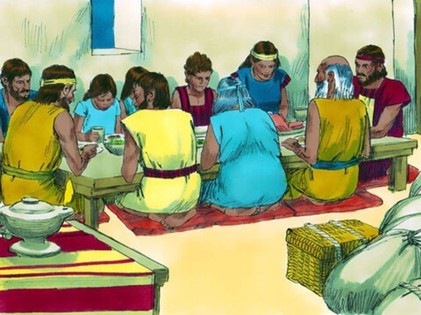
On the other hand, among the Israelites, it was so peaceful that not even a dog barked. God made a distinction between the Egyptians and the Israelites.
All the officials of Egypt ran to Mosses and fell to the ground before Moses. “Please leave,” they begged. They did not go to Pharaoh to beg because they knew Pharaoh’s stubborn heart, and they thought that Pharaoh would harden his heart again. However, they did not know how the last plague impacted Pharaoh, who lost his firstborn son and was completely broken down. All his power that ruled over the most powerful nation in the world could not do anything before the tenth plague from God.
So far, Pharaoh was in his fortified palace throughout the first nine plagues, which did little to him and his royal family despite the ordinary Egyptians’ great suffering. Finally, the tenth plague directly got into his skin. Pharaoh tasted the miserable feeling the ordinary Egyptians had out of the first nine plagues. After losing his most beloved firstborn son, he felt God’s absolute power. Pharaoh waled partly because of the sorrow of losing his oldest son and partly because of the fear of God falling on him. He was also angry at him too. In fact, he caused his oldest son’s death. He could not make his dead son live again, which made him feel completely helpless. Pharaoh cried over his dead son, but silently in his heart. His sorrow, regret, fear, and misery fully occupied his heart and mind.
Pharaoh finally realized that he had to stop his battle against God. He immediately sent for Moses and Aaron during the night.
“Get out!” Pharaoh loudly shouted while giving out his order. “Leave my people—and take the rest of the Israelites with you! Go and worship God as you have requested. Take your flocks and herds, as you said, and be gone. Go, but bless me as you leave.” However, it was not an order indeed but a plea of Pharaoh.
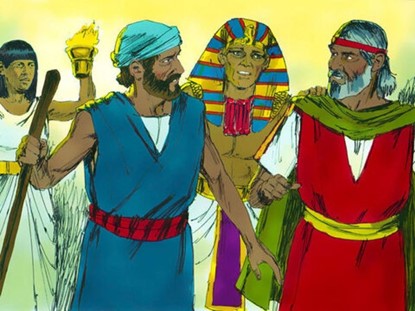
Finally, Moses heard what he had waited for throughout his entire life. Moses looked up to God and thanked God, who kept his covenant with Abraham, Isaac, and Jacob. Although they had just looked forward to seeing the promise and died, Moses was about to touch it. He realized he was the recipient of the promise, and Moses bowed down to God while fully appreciating the lifelong walk with God. Without the walk, he could not arrive at this moment. Especially the first nine plagues were truly difficult tests for Moses. Moses already knew what Pharaoh would do. Although Pharaoh pretended to listen to Moses, Pharaoh would harden his heart soon after Moses left the palace. Even so, Moses humbly followed God’s command. Moses went to Pharaoh when God told him to do so. Then Moses faithfully delivered God’s message, “Let my people go,” and brought down God’s plagues like clockwork. Without such absolute obedience in humility before God, Moses could not endure, but Moses did all in faith humbly before God.
Soon all the Egyptians heard Pharaoh gave in to God’s power. Then they ran into the people of Israel and urged them to leave their country as quickly as possible, for they even thought, “We will all die!” by God’s power. So far, they could not speak up because of Pharaoh. They wanted to escape the miserable plagues falling on them, and they knew the stubborn heart of Pharaoh caused all the plagues. They became looking up to the Israelites because they realized that the Israelites were God’s people whom God protected with His mighty hand. Although Pharaoh was their God, he did nothing for them. He had just sat on the throne in his fortified palace while protected from the devastating plagues. The last tenth plague took away their oldest sons. They wailed over the loss of their oldest son, which put them in absolute fear of death by God. The change in Pharaoh’s heart was the most welcome news since the first plague. One thing left for them was to let the Israelites leave their country as soon as possible, the source of all the plagues.
Per Moses’ order, the Israelites left Egypt. They took their bread dough before yeast was added. They wrapped their kneading boards in their cloaks and carried them on their shoulders. And the people of Israel did as Moses had instructed; they asked the Egyptians for clothing and articles of silver and gold. God caused the Egyptians to look favorably on the Israelites, and they gave the Israelites whatever they asked for. So they practically stripped the Egyptians of their wealth!

It was the night that the Israelites had been waiting for generations. On that night, the people of Israel left Rameses and started for Succoth. There were about 600,000 men, plus all the women and children. The total number of Israelites who left Egypt approached 2,000,000 or more.
The people of Israel had lived in Egypt for 430 years. In fact, it was on the last day of the 430th year that all God’s people left the land. On this night, God kept his promise to bring his people out of the land of Egypt. Only 70 people came into Egypt, but when they left Egypt, they became countlessly many by being a great nation as promised to Abraham.
Then the LORD took Abram outside and said to him, “Look up into the sky and count the stars if you can. That’s how many descendants you will have!” (Genesis 15:5)
It was the night that belonged to God. Moses instructed them not to forget the night and to commemorate each year by all the Israelites, from generation to generation,
“And in the future, your children will ask you, ‘What does all this mean?’ Then you will tell them, ‘With the power of his mighty hand, the LORD brought us out of Egypt, the place of our slavery. Pharaoh stubbornly refused to let us go, so the LORD killed all the firstborn males throughout the land of Egypt, both people and animals. That is why I now sacrifice all the firstborn males to the LORD—except that the firstborn sons are always bought back.’ This ceremony will be like a mark branded on your hand or your forehead. It is a reminder that the power of the LORD’s mighty hand brought us out of Egypt.”
A rabble of Egyptians also went with them, along with great flocks and herds of livestock. They saw and believed in God. Pharaoh, their God, was, after all, not a real god, powerless before the true God who freed the Israelites from the hand of Pharaoh, who did everything he could to keep the Israelites as slaves forever. Although Pharaoh was the most powerful person on the earth’s surface at that time, he could not compete against God. After all, his firstborn son died like the other Egyptian firstborn sons. They completely lost faith in Pharaoh and followed the Israelites because they also trusted God. To them, it was the day liberating from Pharaoh, the tyrant, who ruled over them with no real care to them. They left Egypt together with the Israelites with all their belongings.
All the people of Israel followed all the LORD’s commands to Moses and Aaron. And God brought the people of Israel out of the land of Egypt like an army. A rabble of non-Israelites also followed.
From then on, the Israelites just followed Moses, and Moses followed God to the promised land. Indeed, the promised land was not far from Egypt. The direct path was about a week-journey away. Very few people knew this fact because they were just slaves in Egypt.
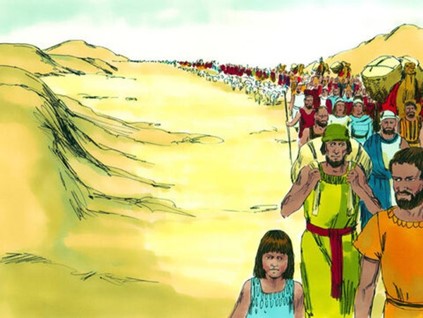
By the way, when Pharaoh finally let the people go, God did not lead them along the main road that runs through Philistine territory, even though that was the shortest route to the Promised Land. Why did God do this to the people of Israel? Because they were the most precious and loving possession of God as our children are the most precious to us.
God knew human hearts. God knew how the Israelites would respond to God when the situation changed. Especially, the situation became difficult to bear.
How about us? Are we always faithful to God under all circumstances as God is to us?
Surely, we give thanks to God when we get what we want. Then how about when we get what we don’t want or have never liked to have after fervently praying to God, after not just one prayer, but countlessly many prayers with a truly contrite heart? Surely we became completely disappointed and even felt betrayed by God. Then the most important one is the next step — how to respond to God. For example, like a teenager, have we become rebellious toward God with anger and resentment? Or even have we completely left God?
Then let’s ask. How have we felt when we met God for the first time? Have we felt the blessings lavishly pouring down from God, haven’t we? God gave more than we think or imagine. He cared for us like parents who dearly loved their babies. He protected us and provided all we needed and even more in His love. It was a beautiful time with God, but we were still babies, just receiving all the cares of God as God provided.
Then the beautiful babies grow in Him. As time goes by, we become teenagers in Him starting to know the world and be aware of ourselves. Then like teenagers, we start to demand what we want. Although we think we know everything. It is not true. In reality, most of our thoughts and desires as teenagers did not align with reality, but something percolated up from the teenager’s immature hearts and minds still under development. Modern technologies can now visualize the internal operations of the human brain. The distinctive functional differences between a teenager’s and an adult’s brains are visible. Visually we can see a teenager’s brain is still maturing, not like that of an adult. Modern science proves that it is not a mystery or a just conjecture but a reality that teenagers think differently. As a result, teenagers’ reasoning often runs into a crash course with reality, but unfortunately, reality always wins.
The spiritual realm is not much different. After we meet God, we are in joy because we are in His loving care by becoming His baby, and then we grow in Him as He nurtures us. We become teenagers spiritually before being fully mature in Him. Thus, we go through the stage of a spiritual teenager.
God, our spiritual, Ever-loving Father, does the right thing for us, although it is painful to us. Then as many teenagers feel that their parents are absolutely wrong and even ridiculous, we might have the same feeling toward God.
Regardless of our response to God, He faithfully guides us through the paths of righteousness, as earthly parents do. Indeed, earthly parents are not perfect. Thus, sometimes they make mistakes, but our Heavenly Father always perfectly leads us through the paths of righteousness.
Please note that God “lead” us, not “control” us. This reflects the true beauty of our relationship with God.
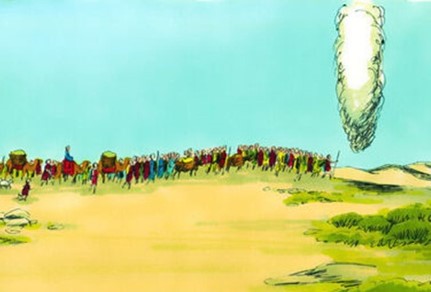
God often calls Himself a good shepherd. A good shepherd takes care of his sheep and protects against all dangers. And a good shepherd leads his sheep to a green pasture. He does not control each step that his sheep take.
A good shepherd truly desires all his sheep to follow him faithfully. Of course, from time to time, a good shepherd uses his rod and staff to protect sheep from impending danger or to rescue sheep already trapped. The shepherd’s rod and staff are painful to sheep, but God does in His love. Surely, God loves us and guides us like a good shepherd while protecting us from all harms that we cannot know or perceive. Yes, we are His sheep under His good care.
The Israelites had just freed from the bondage of slavery in Egypt. They were indeed God’s babies who did not know what was good and evil. They could be swayed by virtually anything. Then, God’s concern was what they would do when they become teenagers in faith in God. Indeed, the Promised Land was for the mature in faith in God, not a baby who just drank spiritual milk provided by God.
For someone who lives on milk is still an infant and doesn’t know how to do what is right. Solid food is for those who are mature, who through training have the skill to recognize the difference between right and wrong. (Hebrews 5:13-14)
Then what would be the next logical step for God? Should God take the Israelites who were just babies in Him directly to the promised land filled with good (flowing milk and honey) and evil (those hostile to the Israelites already living in the Promised Land)? The answer is obviously, no. The Israelites were not mature enough to occupy the Promised Land. They needed time to walk with God.
Walking with God is not a 100-meter dash following a straight line drawn on the well-prepared track surface meticulously prepared for the runners, but a long-distance marathon, running exactly 42.195 kilometers through real-world ordinary roads not specifically prepared for the marathon runners. Yes, walking with God is not a sprint finishing in ten seconds but a life-long journey through hills and valleys. Then we are getting slowly and steadily matured in Him. Then let’s ask a question — what would be God’s choice for the Israelites just freed from Egypt?
God came to Moses and said, “If the people are faced with a battle, they might change their minds and return to Egypt.” Moses silently heard God. Moses looked back on his lifelong journey with God. Then Moses looked at the Israelites just freed. They were just babies in faith in God. Moses was concerned about the Israelites’ immaturity in faith. Moses also doubted whether the Israelites could inherit the Promised Land. Moses spent 40 years with God, and Moses truly appreciated the value of walking with God, which made him who he was – faithful, obedient, and humble to God under all circumstances. God shared His plan, and Moses nodded. Then Moses gave thanks to God for His love and unparalleled wisdom for the Israelites, his brothers and sisters. Moses fully committed again to following wherever God leads. Moses deeply appreciated God’s hand that shaped Moses to the fullest after his 40 years of journey with God.
So through Moses, God led them in a roundabout way through the wilderness toward the Red Sea. Then Israelites followed Moses as God directed them like an army ready for battle.
Moses also took the bones of Joseph with him, for Joseph had made the sons of Israel swear to do this. Joseph said, “God will certainly come to help you. When he does, you must take my bones with you from this place.”
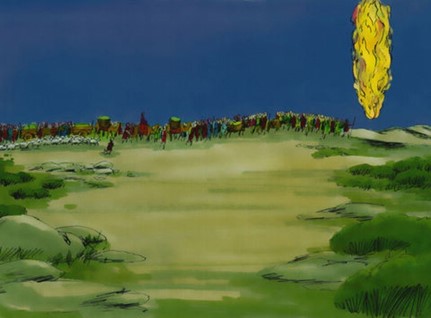
Under the leadership of Moses, humble and obedient to God, the Israelites left Succoth and camped at Etham on the edge of the wilderness. God went ahead of them. He guided them during the day with a pillar of cloud, and he provided light at night with a pillar of fire. This allowed them to travel by day or by night. And God did not remove the pillar of cloud or pillar of fire from its place in front of the people. Yes, God loved and took care of them each step by step because they were still babies in Him. How loving God was! God was with them, and they were in God’s infinite care and love.

until we all attain to the unity of the faith, and of the knowledge of the Son of God, to a mature man, to the
